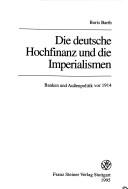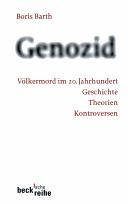| Listing 1 - 10 of 14 | << page >> |
Sort by
|

ISBN: 3515066659 Year: 1995 Publisher: Stuttgart Steiner
Abstract | Keywords | Export | Availability | Bookmark
 Loading...
Loading...Choose an application
- Reference Manager
- EndNote
- RefWorks (Direct export to RefWorks)
Banks and banking, International --- Banks and banking --- International finance --- History --- Germany --- Foreign relations
Book
ISBN: 9004438122 Year: 2020 Publisher: Leiden, The Netherlands ; Boston : Brill,
Abstract | Keywords | Export | Availability | Bookmark
 Loading...
Loading...Choose an application
- Reference Manager
- EndNote
- RefWorks (Direct export to RefWorks)
The civilizing mission associated with nineteenth-century colonialism became harder to justify after the First World War. In an increasingly anti-imperialist culture, elites reformulated schemes for the "improvement" of "inferior" societies. Nation building, social engineering, humanitarianism, modernization or the spread of democracy were used to justify outside interventions and the top-down transformation of non-western, international or even domestic societies. The contributions in Civilizing Missions in the Twentieth Century discuss how these justifications influenced Polish nation building, Scandinavian disarmament proposals and technocratic social policies in the interwar years. Treatment of the second half of the century covers the changing cultural context of European humanitarianism, as well as the influence of American social science on US foreign policy, more particularly democracy promotion. Contributors are: Boris Barth, Rolf Hobson, Jurgen Osterhammel, Frank Ninkovich, Bianka Pietrow-Ennker, Karen Gram-Skjoldager, Esther Moeller, and Jost Dulffer.
World politics --- 1900-1999 --- Western countries --- Foreign relations.
Book
ISBN: 3896697099 9783896697097 Year: 2005 Publisher: Konstanz UVK
Abstract | Keywords | Export | Availability | Bookmark
 Loading...
Loading...Choose an application
- Reference Manager
- EndNote
- RefWorks (Direct export to RefWorks)

Abstract | Keywords | Export | Availability | Bookmark
 Loading...
Loading...Choose an application
- Reference Manager
- EndNote
- RefWorks (Direct export to RefWorks)
Book
ISBN: 3030783863 3030783855 Year: 2022 Publisher: Cham, Switzerland : Springer,
Abstract | Keywords | Export | Availability | Bookmark
 Loading...
Loading...Choose an application
- Reference Manager
- EndNote
- RefWorks (Direct export to RefWorks)
World War, 1939-1945 --- Aerial operations. --- Europe --- History --- Battles, sieges, etc. --- Military operations
Book
ISBN: 9783030783860 9783030783853 9783030783877 9783030783884 Year: 2022 Publisher: Cham Springer International Publishing :Imprint: Palgrave Macmillan
Abstract | Keywords | Export | Availability | Bookmark
 Loading...
Loading...Choose an application
- Reference Manager
- EndNote
- RefWorks (Direct export to RefWorks)
History --- History of Europe --- nieuwste tijd --- geschiedenis --- Tweede Wereldoorlog --- Europese geschiedenis --- nieuwe tijd --- holocaust --- anno 1500-1799 --- anno 1800-1999 --- anno 1940-1949 --- Europe
Multi
ISBN: 9783030783860 9783030783853 9783030783877 9783030783884 Year: 2022 Publisher: Cham Springer International Publishing, Imprint: Palgrave Macmillan
Abstract | Keywords | Export | Availability | Bookmark
 Loading...
Loading...Choose an application
- Reference Manager
- EndNote
- RefWorks (Direct export to RefWorks)
This book analyses the process of 'reshaping' liberated societies in post-1945 Europe. Post-war societies tried to solve three main questions immediately after the dark times of occupation: Who could be considered a patriot and a valuable member of the respective national community? How could relations between men and women be (re-)established? How could the respective society strengthen national cohesion? Violence in rather different forms appeared to be a powerful tool for such a complex reshaping of societies. The chapters are based on present primary research about specific cases and consider the different political, mental, and cultural developments in various nation-states between 1944 and 1948. Examples from Italy, France, Norway, Denmark, Greece, Ukraine, Lithuania, Belarus, Czechoslovakia, and Hungary demonstrate a new comparative and fascinating picture of post-war Europe. This perspective overcomes the notorious East-West dividing line, without covering the manifold differences between individual European countries. Ota Konrád is Associate Professor of Modern History at Charles University in Prague, Czech Republic. He has worked on topics dealing with the history of East-Central Europe in the twentieth century. Recently, he co-edited In the Shadow of the Great War: Physical Violence in East-Central Europe, 1917-1923 (2021). Boris Barth is Professor of Modern and Contemporary History at Charles University in Prague, Czech Republic. His publications include Europa nach dem Großen Krieg. Die Krise der Demokratie in der Zwischenkriegszeit 1918-1938 (2016) and Civilizing Missions in the Twentieth Century (edited with Rolf Hobson, 2020). Jaromír Mrňka is Researcher at the Institute for the Study of Totalitarian Regimes, and Junior Research Fellow at Charles University in Prague, Czech Republic. He has studied the social mechanisms of denunciation, collective violence, and conflict-related acts of sexual violence in the Czech Lands during the Second World War and its aftermath.
History --- History of Europe --- nieuwste tijd --- geschiedenis --- Tweede Wereldoorlog --- Europese geschiedenis --- nieuwe tijd --- holocaust --- anno 1500-1799 --- anno 1800-1999 --- anno 1940-1949 --- Europe
Digital

ISBN: 9781789209402 Year: 2021 Publisher: New York; ; Oxford Berghahn Books
Abstract | Keywords | Export | Availability | Bookmark
 Loading...
Loading...Choose an application
- Reference Manager
- EndNote
- RefWorks (Direct export to RefWorks)
Book

ISBN: 211129411X 2110975121 Year: 2017 Publisher: Paris : Institut de la gestion publique et du développement économique,
Abstract | Keywords | Export | Availability | Bookmark
 Loading...
Loading...Choose an application
- Reference Manager
- EndNote
- RefWorks (Direct export to RefWorks)
Les relations économiques et financières franco-allemandes ont leur spécificité qui en fait un champ d’étude à la fois varié et susceptible de maints prolongements. Cet ouvrage rassemble seize communications, également réparties entre les deux pays, dont plusieurs issues de recherches menées à partir de sources inédites. Toutes ont été présentées et discutées lors d’un colloque qui formait lui-même l’aboutissement de trois années durant lesquelles s’est réuni, au rythme de quatre à cinq séances par an, un atelier placé sous le double parrainage du Comité pour l’histoire économique et financière de la France et de l’Institut historique allemand de Paris. Les sujets abordés sont variés : études sectorielles ; monographies d’entreprises ; place des politiques publiques ; importance de certains espaces de confrontation et de coopération, proches ou lointains ; rôle de la construction européenne... Leur mise en perspective devrait apporter des éléments de réponse et fournir des pistes de réflexion à propos de problèmes qui, loin d’être inédits et particuliers à la période présente, forment autant de permanences dans les relations franco-allemandes, quelle que soit l’époque considérée : déséquilibres structurels, poids des facteurs politiques, multiples ambivalences des regards croisés où s’articulent fascination et répulsion, admiration et rejet, modèle et contre-modèle.
Economics --- History --- relations franco-allemandes --- construction européenne --- politiques publiques --- entreprises
Book

ISBN: 9781789209396 1789209390 9781789209402 Year: 2021 Publisher: New York Oxford
Abstract | Keywords | Export | Availability | Bookmark
 Loading...
Loading...Choose an application
- Reference Manager
- EndNote
- RefWorks (Direct export to RefWorks)
Whether victorious or not, Central European states faced fundamental challenges after the First World War as they struggled to contain ongoing violence and forge peaceful societies. This collection explores the various forms of violence these nations confronted during this period, which effectively transformed the region into a laboratory for state-building. Employing a bottom-up approach to understanding everyday life, these studies trace the contours of individual and mass violence in the interwar era while illuminating their effects upon politics, intellectual developments, and the arts.
Violence --- Peace-building --- Nation-building --- World War, 1914-1918 --- European War, 1914-1918 --- First World War, 1914-1918 --- Great War, 1914-1918 --- World War 1, 1914-1918 --- World War I, 1914-1918 --- World War One, 1914-1918 --- WW I (World War, 1914-1918) --- WWI (World War, 1914-1918) --- History, Modern --- Stabilization and reconstruction (International relations) --- State-building --- Political development --- Building peace --- Peacebuilding --- Conflict management --- Peace --- Peacekeeping forces --- Violent behavior --- Social psychology --- History --- Social aspects
| Listing 1 - 10 of 14 | << page >> |
Sort by
|

 Search
Search Feedback
Feedback About UniCat
About UniCat  Help
Help News
News